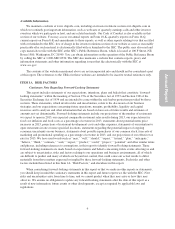Chipotle 2012 Annual Report Download - page 21
Download and view the complete annual report
Please find page 21 of the 2012 Chipotle annual report below. You can navigate through the pages in the report by either clicking on the pages listed below, or by using the keyword search tool below to find specific information within the annual report.
to these or different matters in the future. Our customers also occasionally file complaints or lawsuits against us
alleging that we’re responsible for some illness or injury they suffered at or after a visit to our restaurants, or that
we have problems with food quality, operations or our food related disclosure or advertising practices. See
“Governmental regulation in one or more of the following areas may adversely affect our existing and future
operations and results, including by harming our ability to open new restaurants or increasing our operating
costs” above, for additional discussion of these types of claims. From time to time, we also face claims alleging
that technology we use in our business infringes patents held by third parties. We believe the number of all of the
foregoing types of claims has increased as our business has grown and we have become more visible to potential
plaintiffs and their lawyers, particularly in California. We are also undergoing government investigations as
described elsewhere in this report, including under “Risks Related to Operating in the Restaurant Industry—Our
business could be adversely affected by increased labor costs or difficulties in finding the right employees for our
restaurants and the right field leaders.” Regardless of whether any claims against us are valid, or whether we’re
ultimately held liable for such claims, they may be expensive to defend and may divert time and money away
from our operations and hurt our performance. A significant judgment for any claims against us could materially
and adversely affect our financial condition or results of operations. Any adverse publicity resulting from these
allegations may also materially and adversely affect our reputation or prospects, which in turn could adversely
affect our results.
Risks Related to our Unique Business Strategy
We may not persuade customers of the benefits of paying our prices for higher-quality food.
Our success depends in large part on our ability to persuade customers that food made with higher-quality
ingredients is worth the prices they will pay at our restaurants relative to prices offered by some of our
competitors, particularly those in the quick-service restaurant segment. We may not successfully educate
customers about the quality of our food, and customers may not care even if they do understand our approach.
That could require us to change our pricing, advertising or promotional strategies, which could materially and
adversely affect our results of operations or the brand identity that we have tried to create. Consumers may also
be more price-sensitive during periods of economic difficulty or uncertainty, and we experienced some decrease
in traffic during late 2008 and throughout 2009 that we attribute in part to menu price increases. Recent reports
have indicated continued consumer uncertainty that may persist during 2013, so our ability to increase sales may
be significantly hampered for the foreseeable future. If we do elect to increase menu prices, it may adversely
impact our customer traffic.
Our Food With Integrity philosophy subjects us to risks.
The principle of Food With Integrity constitutes a significant part of our business strategy. We use a
substantial amount of ingredients grown or raised with an emphasis on practices we believe to be more
sustainable or responsible than some conventional practices, and try to make food as fresh as we can. We do,
however, face challenges associated with pursuing Food With Integrity. There are higher costs and other risks
associated with purchasing ingredients grown or raised with an emphasis on quality, sustainability and other
responsible practices. Growth rate and weight gain can be lower for chickens, cattle and pigs that are not fed sub-
therapeutic antibiotics and for cattle that are not given growth hormones. Crops grown organically or using other
responsible practices can take longer to grow and crop yields can be lower. It can take longer to identify and
secure relationships with suppliers that are able to meet our criteria for meat, dairy and produce ingredients.
Given the costs associated with what we believe are more responsible farming practices, and recently due to
decreased demand as a result of the weak economic environment, many large suppliers have not found it
economical to pursue business in this area. Although all of our restaurants generally serve meat from animals
raised in accordance with criteria we’ve established in an effort to improve sustainability and promote animal
welfare, we may experience shortages of meat, particularly chicken or steak, meeting these criteria due to
suppliers suspending production, market conditions, or other forces beyond our control. A few of our markets
have reverted to temporarily serving conventionally raised beef or chicken due to supply shortages, including for
brief periods on a regional basis during 2012 and early 2013. Furthermore, as we grow, the ability of our
suppliers to expand output or otherwise increase their supplies to meet our needs may be constrained. Moreover,
we have
19
Annual Report
























